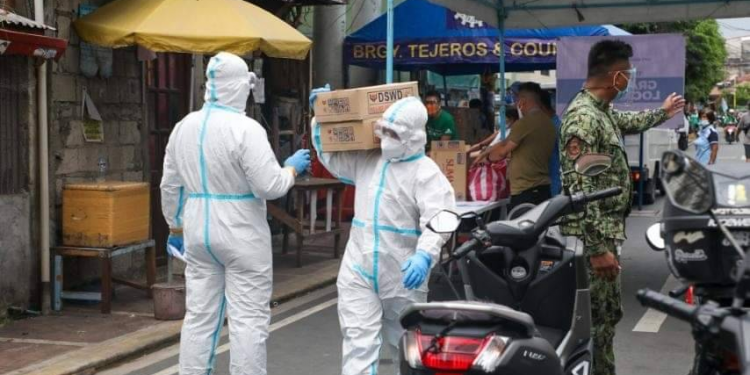Nationwide implementation of expanded COVID-19 alert system wants to be deferred to November 1

FILE PHOTO
The League of Provinces of the Philippines on Wednesday urged the Inter Agency Task Force on COVID-19 (IATF) to defer the implementation of the expanded alert level system in several areas outside of Metro Manila until November 1.
Marinduque Gov. Presbitero Velasco Jr. said the postponement would give local chief executives more time to study the new alert system and cascade the same to their constituents and to those tasked to enforce it.
“May agam-agam po tayong mga gobernador na maapektuhan ng biglang pag implement nitong alert level system. Dahil po biglaan nga po, kailangan pong pag-aralan ang rules din dyan na nakapaloob sa alert level system,” Velasco said.
“Hinihiling natin baka November 1 na po effective date ng implementation para makagawa ng kanya-kanyang executive order ang mga local chief executives para matingnan din po kung ano yung reasonable regulations na pwede nilang i-impose at nakalagay naman po doon sa Omnibus guidelines d’yan sa implementation ng alert level system sa NCR na may karapatan din po ang mga LGUs na maglagay ng reasonable regulations,” he said.
Malacañang said the COVID-19 alert system first tested in Metro Manila has been expanded to several areas starting Oct. 20 until Oct. 31.
“Mas importante po kailangang ma-disseminate, mabigyan ng kopya ang ating mga constituents at maipaliwanag nang mabuti ano ba ang effect nitong bagong alert level system na ito. Yung mag-iimplement din po, yung mga pulis, mga barangay officials. Kailangan din po maipaliwanag nang mabuti kung ano ang gagawin. Hindi po pwedeng biglaan. Sa tingin namin baka maganda po November 1. May sufficient time na po kami para makapag meeting ang task force against COVID,” Velasco said.
Velasco said they also recommend that resolutions by the Inter-Agency Task Force be published on newspapers to further disseminate the information.
Unlike in the capital region, disseminating such regulations is a challenge for the provinces given the weak internet connectivity and locations.
“Kailangan po adequate ang panahon para maipaliwanag po lahat yan kasi apektado ang buhay ng tao d’yan. Apektado ang trabaho, ang paggalaw ng tao so kailangang maipaliwanag nang mabuti. Kailangang mabigyan ng panahon na maganda para maintindihan ng lahat na involved at lalo na yung mga taong hihilingin nating sumunod dito sa mga regulasyon na ganito,” he said.
The governor said he was not informed about the new alert level system and was surprised to learn that it was supposed to be immediately implemented.
Quirino Gov. Dakila Cua supported Velasco’s call for the deferment of the implementation of the COVID alert level system until next month. But Cua said LGUs have been preparing and studying the indicators of the alert level system.
“As early as September, October humingi na tayo ng technical assistance sa IATF para ibaba nga ito at icascade at mapaghandaan nang mabuti,” he said.
Government started testing out the alert system and accompanying granular lockdowns in Metro Manila in mid-September in a bid to curb coronavirus clusters and spur economic activity.
Cua said the ongoing vaccination has lessened the number of severe and critical COVID patients.
“Umaarangkada ngayon. Hopefully makahabol kaagad-agad ang mga probinsya natin para sa ganun lahat tayo may mas safe na Pasko,” he said.
Cua said the challenge now is in convincing more people to get vaccinated.
“If everything goes well, sa tingin ko achievable yung target natin and December might be a hopeful month na ma-achieve natin itong mga substantial herd immunity,” he said.





